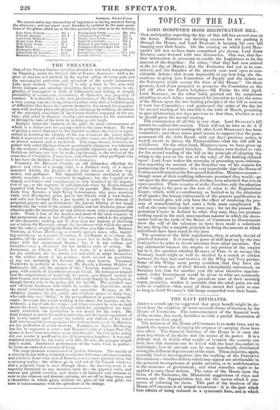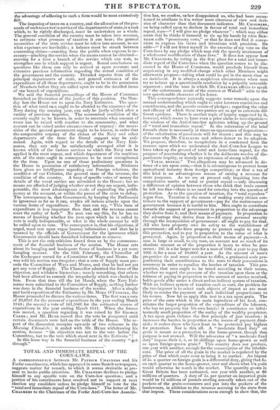THE NAVY ESTIMATES.
ABOUT a month ago we suggested that great benefit might be de- rived from the adoption of more accurate forms of business by the House of Commons. The commencement of the financial work of the session, this week, furnishes us with a partial illustration of the views we then urged.
The business of the House of Commons is to make laws, and to furnish the means for defraying the expense of carrying these laws into effect. The financial function of the House is at once the most important of its duties and the source of its power. It is a delicate task to decide what weight of taxation the country can bear, how this taxation can be levied with the least discomfort to individuals, how its amount can be most beneficially distributed among the different departments of the state. These inquiries, again, naturally lead to investigations into the working of the Executive Government—whether defects which may appear are attributable to the personal incompetence of public servants, or to maleformation in the structure of government ; and what remedies ought to be applied to cure these defects. The votes of the House upon the items of the Estimates, the Ministerial suggestions of ways and means, and the Appropriation Act, are the means which it pos- sesses of enforcing its views. This part of the business of the House of Commons is of annual recurrence : it is the part which best admits of being reduced to a systematic form, and in which
the advantage of adhering to such a form would be most extensively felt.
The imposing of taxes on a country, and the allocation of the pro- ceeds of such taxes to the service of the departments of state, is a task which, to be rightly discharged, must be undertaken as a whole. The general condition of the country must be taken into account, to estimate what pressure of taxation it can bear; the general necessities of the state service must be taken into account, to see what expenses are inevitable ; a balance must be struck between contending claims—exacting from the public when expense is ne- cessary—pinching the service when the means cannot be obtained— starving for a time a branch of the service which can wait, to strengthen one in which support is urgent. Sound conclusions on questions like these can only be arrived at upon accurate and extensive previous information regarding the actual condition of the government and the country. Detailed reports from all the principal departments of state, and general estimates of the expenditure of all these departments, ought to be in the possession of Members before they are called upon to vote the detailed items of one branch of expenditure. We said the financial proceedings of the House of Commons furnished an illustration of the justice of this position. On Mon- day last the House set to upon the Navy Estimates. The ques- tion of what total sum ought to be allotted to the expenses of the Navy during the ensuing year, can only be justly settled after a variety of previous inquiries. The economical condition of the country ought to be known, in order to ascertain what amount of taxes can be raised with comfort to the community, and what amount can be raised under circumstances of urgency : the neces- sities of the general government ought to be known, in order that the comparative urgency of the claims of the Navy and other departments of the state for liberal support may be esti- mated. Again, with regard to the details of the Navy Esti- mates, they can only be satisfactorily arranged after it is known which of the various services to which the Navy can be applied is the most urgent, and which department of the maritime arm of the state ought in consequence to be most strengthened for the time. Upon no one of those preliminary questions is the House in possession of satisfactory information. Ministers have given no intelligence regarding our Foreign relations, the condition of our Colonies, the general state of the revenue, the condition of the country. A heap of specific votes of money for details of the naval service are submitted to the House ; but no means are afforded of judging whether or not they are urgent, indis- pensable, the most advantageous mode of expending the public money at the moment, or within the power of the state to defray. The consequence is, that Government, by keeping the Parliament in ignorance as far as it can, evades all serious attacks upon the various items of expenditure. No man can say, " This item of expenditure is less important than that, and the revenue cannot meet the outlay of both." No man can say this, for he has no means of knowing whether the item upon which he is called to vote is really indispensable, or what is the whole amount he will be called upon to vote. The consequence is, that his objections, if urged, must rest upon vague hearsay information ; and then he is taunted by the officials of Government for the ignorance which Government should have furnished information to remove.
This is not the only criticism forced from us by the commence- ment of the financial business of the session. The House sets about its bungling and inadequate forms of business in a yet more bungling manner. On the 12th February, the Chancellor of the Exchequer moved for a Committee of Ways and Means. He was told his motion was irregular ; that a vote of Supply must pre- cede the Committee of Ways and Means, and that he had not yet got any vote of Supply. The Chancellor admitted the force of the objection, and withdrew his motion ; merely remarking, that others had been allowed to commit the irregularity which was checked in him. From that time till the 1st March, when the Navy Esti- mates were submitted to the Committee of Supply, nothing further was done in the financial business of the session. After a simple and lucid exposition of the Estimates by Mr. MORE OTERRALL, the House proceeded to discuss the various items. The first was a vote of 29,6941. for the excess of expenditure in the year ending March 1840; the second a vote of 161,5001. for the estimated excess of expenditure in the year ending March 1841. When the former was moved, a question regarding it was raised by Sir GEORGE CLERK; and Mr. HUME moved that the vote be postponed until certain documents were laid on the table of the House. The re- port of the discussion occupies upwards of two columns in the Morning Chronicle : it ended with Mr. HUME withdrawing his motion, because " his objection was not to the vote before the Committee, but to the vote which stood next in the Estimate "
In this loose way is the financial business of the country " got through."



























 Previous page
Previous page